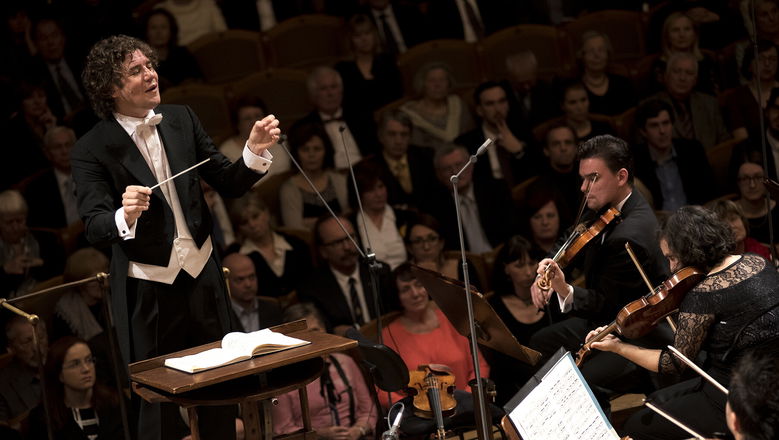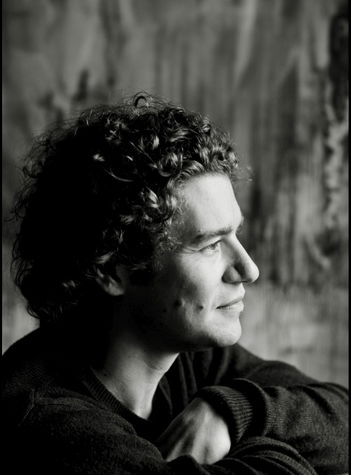Programme
Robert Schumann
Violin Concerto in D minor
Hector Berlioz
Symphonie fantastique, Op. 14
Secure your seat for the 2025/2026 season – presales are open.
Choose Subscription
Robert Schumann
Violin Concerto in D minor
Hector Berlioz
Symphonie fantastique, Op. 14
Vilde Frang violin
Robin Ticciati conductor
Czech Philharmonic

Vilde Frang violin
Robin Ticciati conductor

Robin Ticciati has been Principal Conductor of the Scottish Chamber Orchestra since the 2009/2010 season and Music Director of the Glyndebourne Festival Opera since the summer of 2014. He took up his position as Music Director of Deutsches Symphonie-Orchester Berlin in September 2017.
In the current and next seasons, the 34-year old conductor will return to Symphonieorchester des Bayerischen Rundfunks, Chamber Orchestra of Europe, Staatskapelle Dresden, NDR Elbphilharmonie Orchester, Vienna Symphony, Swedish Radio Symphony Orchestra, Budapest Festival Orchestra, London Symphony Orchestra, Orchestre National de France and Czech Philharmonic. In November 2016 he toured with the London Philharmonic Orchestra and Anne-Sophie Mutter, performing concerts at Vienna’s Musikverein, the Berlin Philharmonie, the Gasteig in Munich and Théâtre des Champs-Élysées in Paris. In the 2014/2015 season Robin Ticciati led a European tour of the Royal Concertgebouw Orchestra Amsterdam and could be heard at the Konzerthaus in Vienna in the context of a residency with the Concertgebouw Orchestra, the London Symphony Orchestra, the Scottish Chamber Orchestra and the Vienna Symphony. From 2010 to 2013 he was First Guest Conductor of the Bamberg Symphony.
During his first two seasons as Music Director of the Glyndebourne Festival, Robin Ticciati conducted new productions of Strauss’s Der Rosenkavalier and Mozart’s La finta giardiniera, Mozart’s Entführung aus dem Serail and a revival of the Ravel double bill with L’heure espagnole and Lʼenfant et les sortilèges. In the current season he will conduct the Orchestra of the Age of Enlightenment in a new production of Mozart’s La clemenza di Tito (directed by Claus Guth). Besides Glyndebourne, in the recent past Robin Ticciati conducted Britten’s Peter Grimes at La Scala in Milan, Mozart’s Le nozze di Figaro at the Salzburg Festival, Tchaikovsky’s Eugen Onegin at the Royal Opera House in London, and gave his debut at the Metropolitan Opera in New York with Humperdinck’s Hänsel und Gretel. In March 2017 he successfully returned to the Met with Tchaikovsky’s Eugen Onegin.
In his eighth season as Principal Conductor of the Scottish Chamber Orchestra (SCO) Robin Ticciati focused on contemporary composers, as well as works by Bruckner, Mozart and Strauss; in the forthcoming 2017/2018 season the backbone of his program will be Dvořák. Tours have led him with SCO through Europe and to Asia, as well as the Edinburgh International Festival. Their recordings on the Linn Records label – symphonies by Haydn, two Berlioz albums and a complete recording of Schumann’s symphonies – received numerous awards and were enthusiastically received by the critics. Robin Ticciati and the Deutsches Symphonie-Orchester Berlin presented their debut CD with works by Debussy and Fauré in September 2017, also on the Linn Records label.
Robin Ticciati was born in London and trained first as a violinist, pianist and percussionist. He played in the National Youth Orchestra of Great Britain until he turned to conducting at the age of 15. His mentors and patrons include Sir Colin Davis and Sir Simon Rattle. In 2014 he was appointed the “Sir Colin Davis Fellow of Conducting” at the Royal Academy of Music in London.
Jean Sibelius
Violin Concerto in D minor, Op. 47
The principal artistic legacy of Finland’s national composer Jean Sibelius consists of his symphonic works. He wrote only one concerto for solo instrument and orchestra, yet it has become one of his most frequently performed works and one of the most difficult and most popular concertos in the entire violin literature.
The Violin Concerto in D minor did not have an easy path to triumph in the world’s concert halls. Sibelius originally dedicated it to the renowned violinist Willy Burmester, who was also supposed to have given the work’s world premiere in Berlin. Shortly beforehand, however, Sibelius found himself in financial difficulty, as he did many times during his lifetime, and plans for the concerto’s premiere had to be re-evaluated. The premiere finally took place in early 1904 in Helsinki with Sibelius himself conducting the local orchestra, and the violin part was entrusted to Viktor Nováček, a rather obscure violinist of Czech origin. The composer had high hopes for the concerto’s premiere, but circumstances did not allow their fulfilment. Nováček did not have enough time to learn the work, nor was his ability up to the demands of Sibelius’s concerto. Disappointed by negative reviews, the composer withdrew the work and went to work on revising it. The second performance of the concerto was at Berlin’s Singakademie, but Sibelius’s publisher had the decisive word in choosing the soloist and conductor. For this reason, Burmester once again was not the performer of the solo part, which was instead played by Karel Halíř, the concertmaster of the Berlin Court Orchestra, and Richard Strauss conducted the performance. Although Halíř also was not a virtuoso on par with Burmester, the second version of the concerto got positive reviews from the Berlin critics. The concerto’s acceptance into the repertoire was slowed by the extraordinary technical difficulty of the solo part. It did not gain its present popularity until after the Second World War, thanks in particular to American violinists including the legendary Jascha Heifetz, who made the first recording of the concerto in 1935.
Sibelius had long desired to write a violin concerto. The choice of instrument was no coincidence; the composer devoted himself intensively to playing the violin. Before the current season began, this evening’s soloist Johan Delane said, “From the work’s technical difficulty, one recognises immediately that Sibelius was a violinist. The concerto exploits all of the instrument’s capabilities, and it is able to describe the natural surroundings of Scandinavia convincingly.” While, for example, the German composers of the early 20th century were taking inspiration from modernism and were exploring the new frontiers of tonality, the character of Sibelius’s music remained very romantic, but one cannot say that his musical language was stuck in the past. Sibelius’s music was also influenced by the French Impressionists, and he is sometimes categorised among those composers. His Violin Concerto literally overflows with melodic motifs that also embody a wide range of moods from lyricism to melancholy and finally the dancelike frolicking of the third movement. The violin part is exceptionally virtuosic in many ways, and the soloist must demonstrate first-class technical skill and expressive feeling. The violin fundamentally carries the melodic material, and the orchestral accompaniment never completely overwhelms the soloist. Here, too, Sibelius undeniably benefits from his experience as a symphonist who was able to make sensitive use of all of the colouristic possibilities of the individual groups of instruments.
Sibelius came from a Swedish-speaking family, and he did not begin to learn to speak Finnish until he was 11 years old. Despite this, he was a patriot all his life and loved Finland’s natural beauty. His compositions were often inspired by nature and by Finnish mythology. Sibelius is regarded as his country’s national composer and as one of the symbols of Finnish identity and of the country’s struggle for independence from Russia. That struggle came to a head with the revolution of 1917, when Sibelius’s homeland won its independence.
Hector Berlioz
Symphonie fantastique, Op. 14